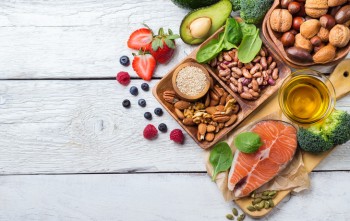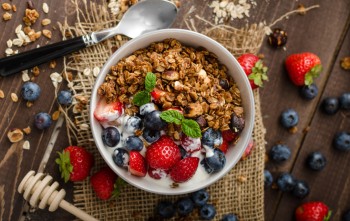"Healthy Secrets for Mother and Baby: Managing Weight During Pregnancy with a Low Glycemic Index Diet

Milla Nurjanati S,Gz
Nutritionist
“Providing the best nutrition with love during pregnancy not only brings joy to oneself but also promises perfection for the life that is growing”.
Pregnant mothers indeed require additional calorie intake and other nutrients to support the baby's development in the womb. However, improper dietary management can lead to nutritional issues for the mother, one of which is obesity during pregnancy. According to the Riskesdas 2018[1] survey, obesity cases are most prevalent among women compared to men.
Complications of Pregnancy Obesity
Pregnancy obesity can cause several complications. In the early stages, it can lead to miscarriage, congenital abnormalities (neural tube defects, spina bifida, congenital heart disease, omphalocele). Whereas in the later stages, it can result in pregnancy-induced hypertension, preeclampsia, gestational diabetes mellitus, premature birth, and stillbirth. Approaching delivery, the option for cesarean section increases, and the morbidity during the surgical procedure also rises.[2]
Moreover, it can also affect abnormal fetal growth. In this case, the fetus may experience macrosomia, a condition where the baby is born larger or with a weight exceeding 4000 grams. Therefore, managing weight during pregnancy is crucial.[3]
What is the Recommended Weight Gain for Pregnant Women?
According to the Institute of Medicine (IOM)[4] [5] research, weight gain recommendations during pregnancy can be categorized based on the nutritional status viewed from the Mother's Body Mass Index (BMI) before pregnancy, calculated using the following formula:
BMI = (Weight (kg))/(Height (m) x Height (m))
Table of Recommended Weight Gain During Pregnancy Based on BMI
BMI | Nutrition Status | Recommended Total Weight Gain |
<18,5 | Underweight | 12.5 -18 |
18,5-24,9 | Normal | 11-16 |
25-29,9 | Overweight | 7 - 11 |
≥30 | Obesity | 5 - 9 |
Recommended prenatal check-ups during pregnancy are at least 4 times. Mothers can consult their obstetrician regarding the ideal weight appropriate for each stage of pregnancy to ensure the baby's proper growth in the womb.
What Are the Nutritional Requirements for Pregnant Women?
Based on the Dietary Adequate Intake (AKG) of 2019[1], the calorie requirement for women aged around 20-35 years is 2150 - 2250 kcal. Calorie needs vary depending on each individual's condition. Pregnant women need an extra amount of nutrients as follows:
Pregnancy | Calorie (kcal) | Protein (g) | carbohydrates (g) | Fat (g) |
Trimester 1 | +180 | +1 | +25 | +2,3 |
Trimester 2 | +300 | +10 | +40 | +2,3 |
Trimester 3 | +300 | +30 | +40 | +2,3 |
As for supporting the extra micronutrient needs, consult with the obstetrician to obtain supplements such as iron tablets, B-complex vitamins, folic acid, calcium, vitamin D, etc.
What Is the Relationship Between a Low Glycemic Index Diet and Managing Weight During Pregnancy?
The glycemic index (GI) indicates how quickly or slowly food is absorbed into the bloodstream[6]. Clinical Nutrition ESPEN[7] research shows that a low glycemic index diet can reduce the risk of excessive weight gain that doesn't align with recommendations during pregnancy and lower the risk of premature birth in high-risk pregnant women with gestational diabetes mellitus. Foods with a low glycemic index with a score of <55 will stabilize the release of blood sugar which prevents the pancreas from working hard to produce insulin after eating. Additionally, they provide a longer feeling of satiety, supporting weight management.
Why is YAVA Present for the Happiness of Pregnant Mothers?
The food ingredients contained in YAVA products, besides having a low glycemic index, also contain beneficial nutrients and delicious for pregnancy.
1. Low-Fat and Low GI Protein Sources
YAVA products contain various nuts such as mung beans, peanuts, and cashews. Nuts have a low GI (15)[8] and are rich in folic acid, omega-3 fatty acids, omega-6 fatty acids, protein, amino acids, iron, and vitamins. Consuming nuts can support fetal development and prevent anemia in pregnant women, low birth weight, and birth defects.
2. Complex Carbohydrate Sources
YAVA products contain complex carbohydrate sources such as rolled oats, sorghum, and red rice. The role of complex carbohydrates during pregnancy includes preventing constipation, aiding better sleep, reducing anxiety, thus improving mood due to enhancing the nervous system's function, and providing extra energy for the body.
3. Providing Healthy and Tasty Breakfasts and Snacks
During pregnancy, there is often morning sickness, characterized by nausea and vomiting, which eventually reduces the appetite. YAVA not only offers good nutrition but also tastes delicious without artificial sugar alcohols, preservatives, or MSG. Thus, it can increase the mother's appetite. The natural sweetness from palm sugar and cocoa powder enhances the taste without worrying about blood sugar spikes.
Is Sugar in YAVA Products Dangerous?
YAVA uses lontar sugar harvested by local farmers in Karangasem, Bali. Lontar sugar is a sweetener derived from the sap of the palmyra palm tree (Borassus flabellifera Lin). Lontar sugar has a low GI of 49-54[9], safe for diabetic patients, provided it is consumed in controlled portions, also has a richer taste compared to cane sugar and coconut sugar. Unrefined lontar sugar contains many vitamins and minerals like potassium, zinc, iron, vitamins B1, B2, B3, and B6[10]. These vitamins and minerals are beneficial for pregnant women, such as vitamin B6, which helps reduce nausea, iron to prevent pregnancy anemia, and its high potassium content that can maintain muscle, heart, and nerve health during pregnancy. Moreover, lontar sugar contains phytonutrients, antioxidants that are beneficial for maintaining immunity during pregnancy.
Seeing the benefits of its ingredients above, YAVA can certainly be a healthy choice product that accompanies you every day, starting from its breakfast products, namely Granola, GO'NOLA and Granola bites; right down to the snack products that you can carry anywhere, namely Wild Harvested Cashew, Krispi Puffs, Granola Puffs, and Popcorn. Make today the first step towards a healthy life by always providing YAVA products everywhere!
Conclusion
A low glycemic index diet indeed supports health during pregnancy as one of the ways to manage the weight of pregnant women, thereby reducing the risk of pregnancy obesity and its complications. This should be balanced with adequate balanced intake of both macronutrients and micronutrients.
YAVA products provide healthy AND delicious breakfasts and snacks that are safe for pregnant women and offer many benefits for both the mother and the fetus. YAVA products can be combined with a variety of other foods such as pregnancy milk, yogurt, kefir, fresh fruits, chia seeds, and others."
Source:
[1] Kemenkes RI. (2019). Peraturan Menteri Kesehatan Republik Indonesia No 28 Tahun 2019 Tentang Angka Kecukupan Gizi yang Dianjurkan untuk Masyarakat Indonesia.
[4] American College of Obstetricians and Gynecologists.(2013). Weight Gain During Pregnancy.
[5] Healthline. 2023. What to Know About Healthy Weight Gain During Pregnancy.
[6] Kemenkes. Pola Makan Rendah Glikemik.
[7] Y Deng dkk. (2023). Effect of low-glycemic index diet advice on pregnant outcomes in women with elevated risk of gestational diabetes mellitus: A meta-analysis of randomized controlled trails. Department of Nutrition and Toxicology, School of Public Health, Hangzhou Normal University, Hangzhou, China.
[8] Glycemic Index Guide. (2023).
[9] Bella C. 2017. Indeks Glikemik Gula Lontar Cair, Cetak, dan Kristal.















